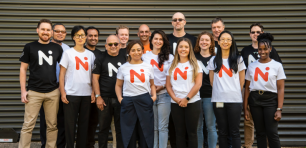
Lumary co-founders Matthew English and Joseph Mercorella. Photographer: Aubrey Jonsson.
South Australian healthtech startup Lumary has raised $17 million in funding, for its tech designed to help service providers navigate the government’s National Disability Insurance Scheme (NDIS).
The round was led by OneVentures, and also included participation from Salesforce Ventures and the South Australian Venture Capital Fund.
It follows on from a $2 million round closed back in August 2019.
Founded by Joseph Mercorella and Matthew English, Lumary is a workflow management solution, designed to help healthcare providers manage their workflow, operations and compliance obligations when dealing with funding bodies such as the NDIS.
“The whole point of the NDIS is to lower the cost of delivering a service,” English explains.
It’s about making sure that money is being spent as efficiently and effectively as possible. Part of that, he notes, is moving providers away from paper-based systems and spreadsheets and adopting tech solutions.
To date, more than $2.5 billion in NDIS services have been processed through the Lumary platform. And the startup is growing, English tells SmartCompany.
Over the past 12 months, revenues have increased by about 80%, he says, which is a trajectory the founders expect will continue.
This latest funding is intended to spur international expansion for Lumary. Initially, the startup has set its sights on the US, where there’s a very different system to navigate, English notes. The team is also considering a move into the German market.
Generally, while health systems differ all over the world, “governments are moving towards value-based or goal-based care, rather than quantity-based,” he explains.
“It’s just about when each country gets there.”
The founders will also be investing in new hires, to make sure the product is in a good position to scale throughout Australia and beyond. No matter how many people you have on board, “it never feels like enough”, English says.
NDIS in the spotlight
Over the past few weeks, there have been rumblings regarding the NDIS in the media, with reports that new individual assessment measures could be detrimental to the people using the scheme, and alter its early intentions of personalised care.
There have also been claims from former NDIS Technology Authority chief Marie Johnson that “fundamental defects” in the technology underpinning the scheme raise concerns about its capacity for innovation.
To an outsider, it could look like the scheme is facing a shakeup, English says.
“We feel like it’s been constantly shaken up every single year, and multiple times.”
These developments are simply things English and his team have to keep an eye on, he notes, to make sure their own products remain up-to-date in best-placed to service their customers.
Of course, this funding boost and growth spurt comes off the back of a 12 months that no one in either tech or healthcare could have expected.
Throughout the COVID-19 pandemic, NDIS participants still needed the same care, English notes. But, there was a shift towards telehealth and remote care solutions.
English says he doesn’t see the sector shifting straight back to face-to-face care, but he doesn’t think telehealth will dominate either.
“Sometimes you just can’t get away from the in-person care … that will never go away,” he notes.
Rather, a hybrid model is “probably where it will end up”.
Handpicked for you

Linktree secures $60 million in Series B funding, as global users top 12 million



COMMENTS
SmartCompany is committed to hosting lively discussions. Help us keep the conversation useful, interesting and welcoming. We aim to publish comments quickly in the interest of promoting robust conversation, but we’re a small team and we deploy filters to protect against legal risk. Occasionally your comment may be held up while it is being reviewed, but we’re working as fast as we can to keep the conversation rolling.
The SmartCompany comment section is members-only content. Please subscribe to leave a comment.
The SmartCompany comment section is members-only content. Please login to leave a comment.